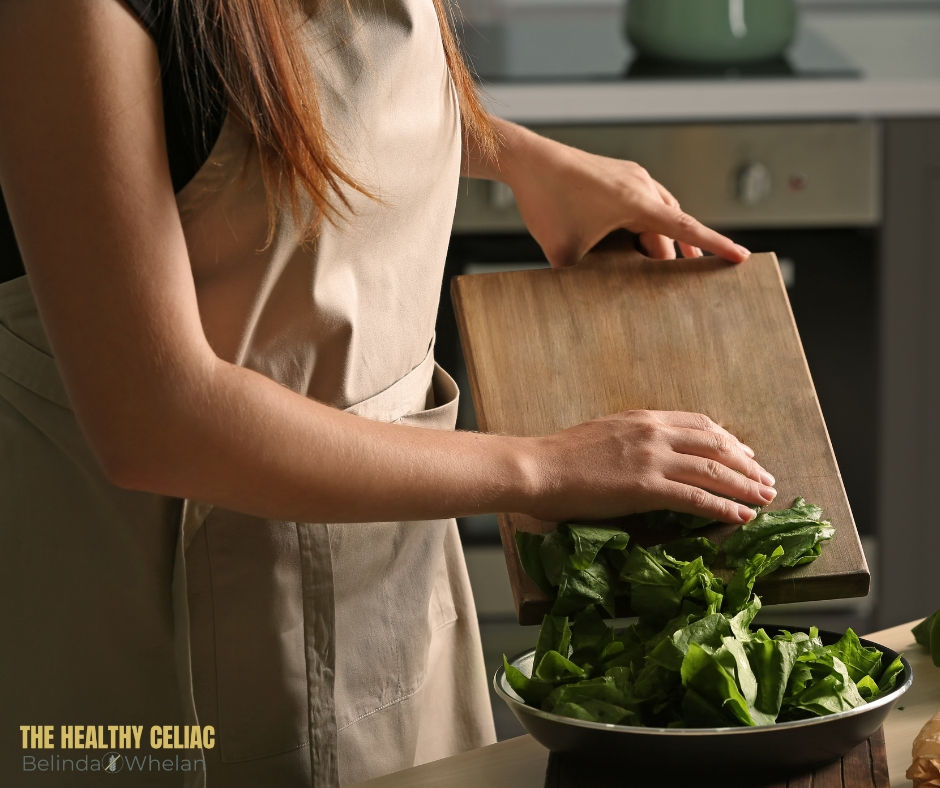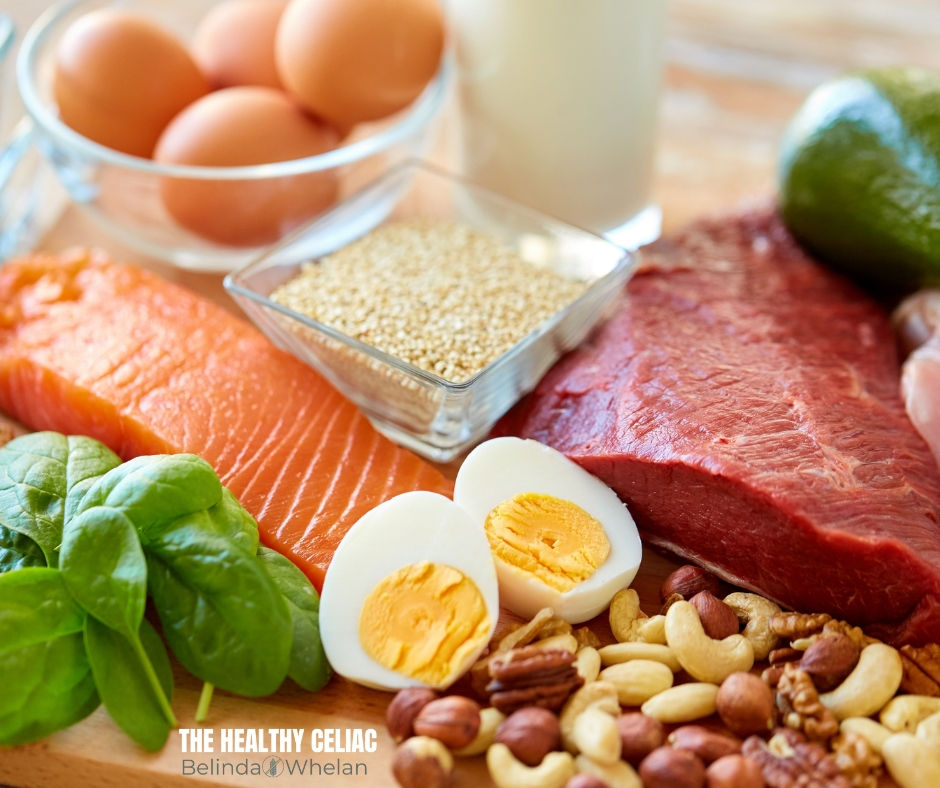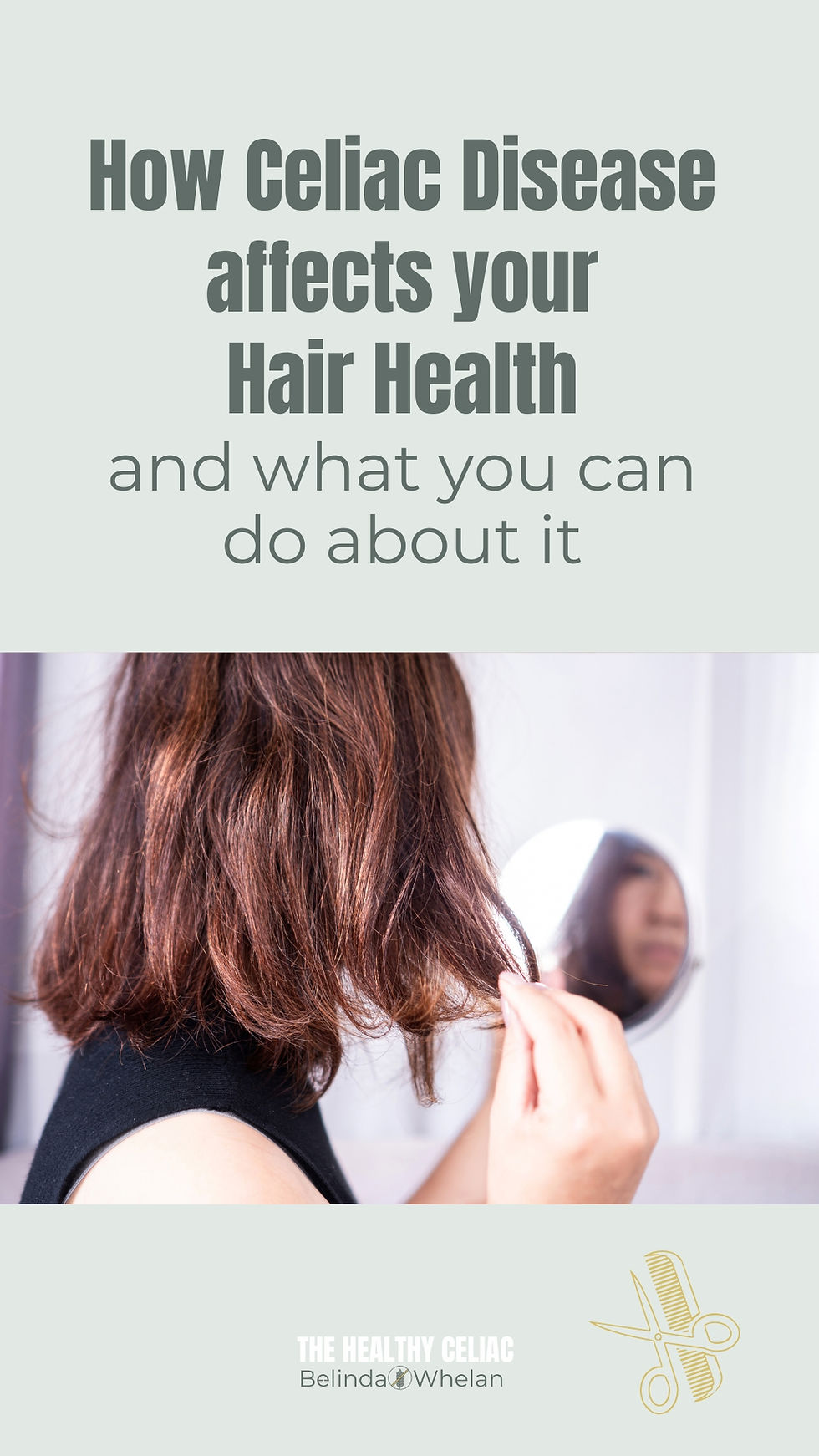How Celiac Disease Affects Your Hair (and What You Can Do About It)
- Belinda Whelan
- Aug 5, 2025
- 5 min read
Updated: Aug 6, 2025
If you’ve noticed your hair getting thinner, drier, brittle, or even falling out since your celiac diagnosis, unfortunately you’re not imagining it.
Your hair is often one of the first places you’ll see something isn’t right internally, especially when you’ve been dealing with undiagnosed celiac disease or you’re still healing after going gluten free.
We’re told to “just eat gluten free” and everything will fix itself. But the truth is, celiac disease impacts so much more than just your gut. It affects your nutrient absorption, hormones, stress levels, immune system and yes, even your hair.
So, if your hair just doesn’t feel like you anymore, let’s talk through what’s really going on and what you can start doing today to turn things around.
Common Hair Problems with Celiac Disease
Women with celiac disease often report share that they struggle with -
Hair thinning or shedding (including lashes and brows)
Dry or brittle hair
Hair that breaks easily
A noticeable lack of growth
Receding hairline or bald patches (in more severe cases)
These are all signs your body isn’t getting what it needs to produce strong, healthy hair. And that almost always starts in your gut.
Why Does This Happen?
When you’re living with undiagnosed or poorly managed celiac disease, your gut lining is damaged. That means even if you’re eating the right foods, your body might not be absorbing key nutrients. Over time, that can lead to multiple deficiencies that show up in places like your nails, skin, energy levels and especially your hair.
Here are the top causes of poor hair health in women with celiac disease and what you can do about each one
1. Nutrient Deficiencies That Impact Hair
There are a handful of nutrients your hair absolutely needs to grow and stay strong. If you're low in even just one of them, your hair health can take a hit.
Here’s what to look out for -
Iron
Iron deficiency is one of the most common causes of hair loss in women, and especially common in celiacs. Iron helps carry oxygen to your hair follicles. Without enough of it, your hair can stop growing and start shedding.
Signs you may be low - Fatigue, pale skin, breathlessness, hair loss, frequent infections.
Gluten free iron-rich foods to include -
Red meat (especially lamb and beef)
Chicken liver or pate
Cooked spinach (pair with vitamin C for better absorption)
Pumpkin seeds
Quinoa
Legumes (like lentils and chickpeas, if tolerated)

Tip: Always get iron levels checked through a blood test before supplementing. Some women may need iron infusions.
Zinc
Zinc is essential for hair follicle health and growth. A lack of it can slow down regrowth and contribute to brittle hair.
Signs you may be low - Poor wound healing, skin rashes, weak immunity, white spots on nails, slow hair growth.
Gluten free zinc-rich foods -
Oysters (the highest natural source)
Beef and lamb
Hemp seeds
Pumpkin seeds
Chickpeas
Cashews
Tip: If supplementing, don’t overdo it. Too much zinc can interfere with copper levels.
B Vitamins (especially B7/Biotin, B12, and Folate)
B vitamins help carry oxygen and nutrients to the scalp and hair follicles. Without them, hair can become dry and brittle.
Signs you may be low - Weak nails, fatigue, tingling in hands/feet, mouth ulcers, poor concentration, hair shedding.
Gluten free B vitamin-rich foods -
Eggs (especially the yolks)
Salmon
Beef liver
Leafy greens
Avocados
Nutritional yeast
Note: B12 is particularly important for vegans or anyone with low stomach acid.
Protein
Your hair is made from keratin, a type of protein. Without enough dietary protein, your body won’t prioritise hair growth.
Signs you may be low: Muscle loss, fatigue, slow recovery, brittle nails and hair.
Protein-rich gluten free foods -
Eggs
Chicken, beef, turkey
Greek yogurt (lactose free if needed)
Lentils, beans, and legumes (if tolerated)
Hemp or chia seeds
Protein powders (clean, gluten free options)

Healthy Fats
Hormones play a huge role in hair health, and healthy fats help support balanced hormones. Fat also aids absorption of fat-soluble vitamins like A, D, E, and K – all important for strong, shiny hair.
Healthy gluten free fat sources to focus on -
Avocados
Olive oil
Fatty fish such as salmon or sardines
Flaxseed oil
Walnuts
Egg yolks
Low-fat diets can really mess with your hair and hormones. You don’t need to be afraid of good fats. You just need to know the best type of healthy fats.
2. Thyroid Disorders and Hashimoto’s
Celiac disease increases your risk of autoimmune thyroid conditions like Hashimoto’s which can lead to hair thinning, dry skin, fatigue, and difficulty losing weight.
If your hair is falling out in clumps or your scalp feels dry and flaky, it’s worth asking your doctor for a full thyroid panel, not just TSH.
3. Chronic Stress
Stress puts your body into survival mode. When that happens, it pauses non-essential functions like hair growth. One of the key phases in the hair cycle can even stop completely, leading to noticeable shedding.
This is very common in the early days of diagnosis when everything feels overwhelming, or during big life transitions (hello, perimenopause).
What helps -
Deep breathing
Gentle movement like walking or yoga
Prioritising rest
Less screen time
Talking to a friend, coach or therapist
Magnesium-rich foods or magnesium baths
4. Hormonal Imbalance
If your hormones are out of whack from perimenopause, poor gut health, or even post-pill recovery then your hair will feel it. Low estrogen and progesterone can both cause dry, thinning hair.
Supportive tips -
Eat enough healthy fats
Balance blood sugar with protein and fat at each meal
Consider herbal or natural support (e.g. maca, vitex (chasteberry), flaxseed if appropriate)
Talk to your doctor if HRT is something you're considering
5. Ongoing Gluten Exposure
Even trace amounts of gluten can cause inflammation and malabsorption which affects how your body uses nutrients to support hair growth.
If you’re still getting “glutened” every month or so, your body doesn’t get the chance to properly heal, and your hair may remain thin, dry, or patchy.
What to check -
Medications
Cross contact at home or dining out
Hidden gluten in sauces, dressings, or skincare
Supplements or vitamins
Oats* (even certified gluten free oats can be reactive for some)
*Please ensure you've done an oats challenge if located in Australia
6. Your Gut Health
Even on a strict gluten free diet, your gut might still be struggling. That means nutrients aren’t being absorbed as well as they should be, and your body has to prioritise healing over hair growth.
Signs your gut still needs healing -
Bloating, gas, constipation, or diarrhea
Fatigue
Skin issues
Poor immune function
Hair, skin, and nail concerns
What helps -
Prioritise whole foods over gluten free processed products
Include fermented foods (if tolerated) like sauerkraut or coconut yogurt
Take a quality probiotic
Bone broth, collagen, or L-glutamine to support healing
Reduce alcohol and sugar where possible
Make a DIY Serum for Lash and Brow growth. DIY here.
Action Steps to Support Your Hair Health
Here’s what to focus on starting today -
Get your bloods checked - Ask for iron, ferritin, zinc, B12, folate, thyroid markers, vitamin D.
Eat a nutrient-rich, whole food gluten free diet - Not just gluten free processed foods.
Prioritise gut healing - Especially if you still have digestive symptoms or ongoing gluten exposure.
Manage your stress - Make rest and recovery non-negotiable.
Support your hormones - Especially if you’re in perimenopause or noticing cycle changes.
Don’t give up - Hair growth takes time. What’s falling out now is a reflection of what was going on months ago.
Hair loss or dryness can be incredibly frustrating, especially when you're doing everything you can to eat gluten free and take care of yourself. But the good news is, your hair can recover.
With the right support (and a focus on healing from the inside out) you can absolutely get back to shiny, strong, healthy hair.
And if you want help with any of this, inside The Healthy Celiac Collective, we go deep on exactly how to restore nutrient levels, support your gut, rebalance your hormones, and feel better in your body again. Jump on the waitlist for the next round here.







Comments